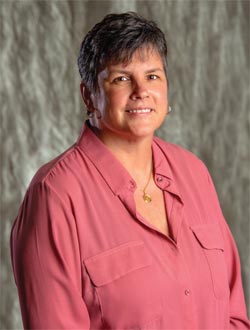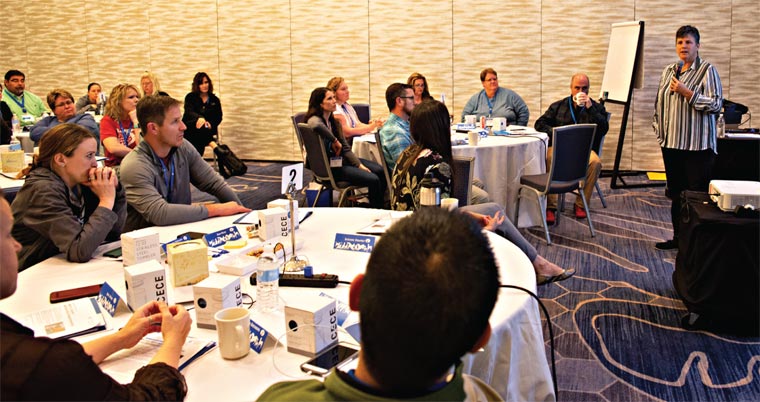
June 15, 2020
Social work expands in veterinary hospitals
Before Lori C. Harbert built a social work program in a Pittsburgh veterinary hospital, she studied every department. She even spent weeks sitting in the lobby to see what clients experienced.
When BluePearl bought Pittsburgh Veterinary Specialty and Emergency Center in late 2017, the new parent company asked her to turn her local program into a national one. The licensed clinical social worker sees it as an opportunity to fight stigma about mental health care, change workplace cultures, expand people’s desire to stay in veterinary medicine, and even help save lives. “That’s a huge advancement in the field of veterinary medicine,” Harbert said.
Veterinary clinics have been slow to hire social workers, she said, and only a few hundred people in the U.S. are trained in veterinary social work. The University of Tennessee College of Veterinary Medicine and College of Social Work established the country’s first veterinary social work program in 2002.

Elizabeth B. Strand, PhD, founding director of veterinary social work and associate professor at Tennessee, said about 170 social workers who enrolled in her program had earned or were earning certificates in either veterinary social work or the related field of veterinary human support. Another 200 earned continuing education through her program.
As the COVID-19 pandemic added uncertainty and instability, veterinary social workers say their expertise is needed now more than ever.
Working together
In human health care, social workers tend to care for patients and help them plan, Dr. Strand said. Veterinary social workers care for everyone but the patients, she said.
“We attend to the human needs that arise at the intersection of veterinary and social work practice,” she said.
That can include counseling or referral to outside therapists. Some veterinarians are struggling but afraid to let colleagues find out.
Social workers also can assist veterinarians with clients who are having trouble letting go of loved ones.
“We step in so the doctors and technicians can continue on with their work,” she said. “We absorb that emotion for them, so it frees them up somewhat to continue to function in their day.”
BluePearl announced last August that it was partnering with Tennessee to train social workers for careers in specialty and emergency veterinary medicine. As part of the agreement, the veterinary hospital chain will help place students enrolled in UT’s postgraduate veterinary social work certificate program. By this spring, BluePearl had hired a social work team including six regional social workers—two from the UT collaboration—and tested training programs for veterinary hospital staff members, who work in fast-paced, high-emotion environments.

Harbert said that, when she started work in Pittsburgh, a veterinarian at her hospital could administer euthanasia five times in one day. The social workers try to get veterinary staff members to stop, talk, and process the grief and loss they experienced.
“Compassion fatigue and burnout is driven by the events that they’re not processing in their day,” she said. “You do that 365 days out of the year, and it becomes so emotionally overwhelming that a lot of our folks cannot manage and they leave the profession.”
Other emergency and specialty hospitals are hiring veterinary social workers to run pet loss support groups, help owners make difficult treatment decisions, and counsel clinical staff members during professional and personal conflicts.
Larger veterinary chains, too, have been hiring. Banfield Pet Hospital created the position of program manager of mental health services in 2018 and hired Lisa Stewart-Brown to fill the position.
Stewart-Brown develops and implements mental health strategies and initiatives meant to support the emotional and mental health of employees. Stewart-Brown, a licensed clinical social worker, received her master’s degree in social work from California State University Sacramento.
Greg Wright, a spokesman for the National Association of Social Workers, confirmed that veterinary social work is growing even though few schools of social work offer training specific to veterinary medicine.

Mental health care lacking
Dr. Strand created the veterinary social work program while she was a doctoral student working in a veterinary hospital for her dissertation.
“I had no idea when I started that I would hear as many people talk about suicide as I did,” Dr. Strand said. “And I mean clients who would say, ‘If you euthanize my dog, you might as well kill me.’”
She also noticed veterinarians would keep working even when it hurt them. Eventually, they told her about upset clients, ethical challenges of offering treatments a client can’t afford, stress, heartache, depression, and anxiety. She knew it was only a matter of time before veterinarians recognized the benefits of working with well-trained social workers.
“I just always knew that it would catch on, and it has caught on,” she said. “I think it’s going to continue to grow.”
But veterinary medicine still has a mental health treatment gap. Dr. Strand, the late Dr. Linda Lord, and John Volk, a consultant with Brakke Consulting, co-authored the second Merck Animal Health Veterinarian Wellbeing Study, which indicates about half of distressed veterinarians who needed mental health treatment or therapy in the past 12 months said they didn’t get it (J Am Vet Med Assoc 2020;256:1237-1244).
If a clinic can’t hire a social worker, there are other options. Employers of all sizes should have employee assistance programs, Volk said at the 2019 Veterinary Wellbeing Summit. Lower educational debt and higher pay likely would also help, he said.
An EAP provides counseling or resources to assist employees with personal or work-related problems and allows staff members to seek help confidentially. Informally, employers could encourage people to take time off to deal with stress and burnout.
Clients, staff members need help
Lisa Hacker became a social work program manager two years ago for Lakeshore Veterinary Specialists, a three-hospital group near Milwaukee. The veterinary hospital group has since hired a second social worker and started a program to train master’s of social work interns, seven of which worked at the hospital as of early this year.
She built a program that offers pet loss support groups open to the public, hosts a pet remembrance event each June, offers education from the company’s social workers to staff members of referring veterinarians’ clinics, and consults with veterinarians for those clinics on difficult cases and clients. The social workers offer clients counseling during crises and after euthanasia, work with veterinary interns and residents to combat compassion fatigue, and train clinic staff members on burnout prevention, conflict de-escalation, empathy, mindfulness, yoga, meditation, and compassion.
Among clients, the social work program often is unexpected but greatly appreciated on what some have described as the worst days of their lives, she said.
Christina Klose, an intensive care unit veterinary technician for Lakeshore, said the company’s social workers often take over the end-of-life or quality-of-life conversations clients need, letting the clinical staff care for other patients waiting to be treated.
“It takes a huge burden off us to know there’s someone who can fill that human part of veterinary medicine, that client connection,” she said.
Dr. Jacob Odders, executive director of Lakeshore, said many of his team members approached him to say hiring social workers was the most influential benefit added to the practices. He estimated half the company employees have consulted with the social workers on personal issues. The social work program improved morale and tenure, helped the staff see more patients, and aided recruitment, he said.
Klose said the social workers at Lakeshore provide reassurance. They changed the hospital culture, she said, giving people confidence to talk more openly.
“I think that every large veterinary hospital and university hospital should have a social worker,” Klose said.

Much of the groundwork for veterinary social work came from veterinary colleges. The Ohio State University College of Veterinary Medicine hosted the first Veterinary Wellbeing Summit in 2012. Jen Brandt, PhD, was the social worker at OSU tasked with creating and implementing the concept of a well-being summit—the first of its kind in the nation.
In 2017, the AVMA hired her to lead the Association’s mental health efforts as director of member wellness and diversity initiatives. She helped the Association co-host its Veterinary Wellbeing Summit and launch an online Workplace Wellbeing Certificate Program to connect veterinary teams with problem-solving resources and create a culture of well-being.
At Michigan State University, the College of Veterinary Medicine and the School of Social Work collaborate on the Veterinary Social Work Service, which offers veterinary teaching hospital clients emotional support, including counseling on difficult treatments and euthanasia. In early April, officials with the Association of American Veterinary Medical Colleges announced they hired a well-being director, Makenzie Peterson, who would start work April 20 to promote well-being in veterinary education. She previously worked as well-being program director at Cornell University College of Veterinary Medicine.
Others have helped integrate social work into clinics and hospitals.
In the early 1990s, Sandra Brackenridge transitioned from helping individual veterinarians understand grief and pet loss to counseling students, faculty members, and clients at Louisiana State University. Today, she consults with veterinary hospitals and social workers as they start social work programs, as well as supervises a veterinary social work program and internship she created at a specialty and emergency hospital in Texas.
Pamela Linden, PhD, is a veterinary social worker and clinical associate professor in the occupational therapy program at Stony Brook University in New York. She said social workers are part of a hospital’s interdisciplinary team, using specialized knowledge to improve outcomes.
Dr. Linden knew of at least 10 social workers in New York who were completing their veterinary social work certificates, adding to a growing veterinary social worker population in the city. A large veterinary hospital has asked her for help securing embedded veterinary social workers.
Dr. Brandt noted that the social workers in hospitals are among the licensed mental health professional who aid veterinarians, including psychologists, therapists, and counselors.
Fear, stress heightened by COVID-19
DoveLewis, an emergency animal hospital in Portland, Oregon, hired a well-being program director in February to support its 160-person hospital team that handled about 23,000 cases in 2019. Dr. Shana O’Marra, chief medical officer at DoveLewis, said burnout and turnover are especially large problems in emergency medicine.
“My goal is to try to create an environment where we’re fostering good habits and behaviors that are going to help to engage in a healthy way, where people are getting rewards from the hard parts of their jobs instead of feeling them as a burden,” Dr. O’Marra said.
Social worker Enid Traisman founded DoveLewis’ pet loss program in 1986 and retired in December. The new well-being director, Debrah Lee, started her work building on existing programs as the COVID-19 pandemic began.
Among her work, she hosted video meetings with DoveLewis teams to give them chances to talk about their experiences, and she uses virtual meetings to keep hosting pet loss support groups.
“I think there’s a lot of comfort and healing that can come in once you address that piece of isolation that I think a lot of us are feeling,” Lee said.
Harbert said her team was working this spring to condense lessons for overwhelmed hospital staff members, reducing one-hour mental health lessons to ones completed in 20-30 minutes. The team also tries to help clinical staff members rest their minds and bodies, she said.
“We get lots and lots of phone calls about people not being able to sleep, and the more they can’t sleep, the more they can’t regulate themselves emotionally,” she said.
Harbert said her team’s social workers also increased their work with staff members and clients by voice and video. They became inundated with calls within the company from people who wanted resources on managing anxiety, stress, and fear.
She said the tools and techniques used by her team remain effective at a distance.
Lee said the additional stress of the pandemic led to changes in how people react, giving them a sense they lack control. That seems to be most common among those in the veterinary hospital who are unable to engage with clients in normal ways and fear for their own safety and the safety of their families.
She describes the science behind how they’re feeling and helps them identify where they retain control in their lives.
“It’s really, really important—more than ever—to connect with practices that are sustaining or soothing,” Lee said.
Lee also reflected on how to expand support programs.
“I think we’re on the brink of a really exciting frontier in veterinary medicine,” she said.
Dr. Strand said that, as more clinics hire veterinary social workers, data will show the impact.
“I think, once the profession is able to see that the presence of a veterinary social worker has a positive impact on the well-being of the profession and clients, that it will be something that is worth the investment,” she said.